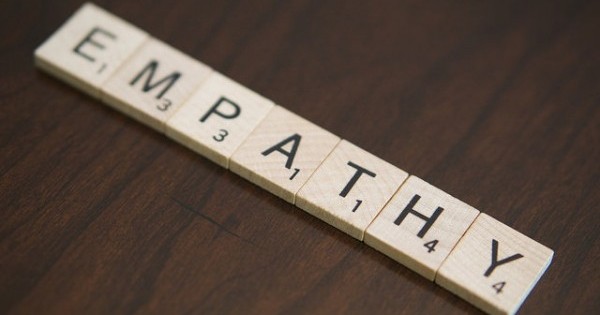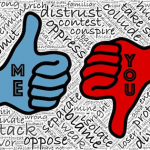
Galen Broaddus (atheist blogger at Across Rivers Wide): Can we take a second and talk about empathy? For me, it’s one of those ideas whose value I almost take for granted, but it’s been demanded of non-Trump supporters over the last few months (as we’ve mentioned here) and there are ways in which I wonder if its unconditional goodness is overstated.
Hind Makki (Muslim blogger at Hindtrospectives): Empathy has definitely been at the forefront of my heart and mind ever since the election. I always wanted to believe that it is instinctual human behavior to have empathy for others (like, this is one of the things that makes us human, along with bi-pedalism and meaning-making), but I’m beginning to realize more and more that empathy must be taught, learned, and reinforced throughout one’s life.
Andy Gill (progressive Christian blogger at Andy Gill): Yes. I always assumed the same. I thought empathy was instinctual. But going to Seminary, surrounded by so many unempathetic pastors, I learnt differently. To be honest, that shit broke me.
Hind: Yes, I must say that I have certainly encountered cruelly careless people in different stages of my spiritual journey. These people — some of them were my teachers — believed so hard in the spiritual rightness of what they were teaching, that they dropped the ball on the behavioral goodness they should have been modelling.
Andy: What’s more disturbing, for me, as someone who’s grown up in the white evangelical Church and seen more behind the curtains than most is that this careless type of cruelty… it’s not careless, so much as it’s continuously done on purpose.
Hind: Is that one of the reasons you left the Evangelical church and began exploring Progressive Christianity, Andy?
Andy: Well, hm, good question, haha. It’s complicated. But yes, no, kind of. As I’ve gone about, not attending Sunday morning service and taken a bunch of time to explore, think, etc., I’ve found that staying Evangelical and continuing to identify as such is the best means of reforming such an influential institution and sect of our society. #OccupyEvangelicalism
I’m curious, though, as it’s tough for me to differentiate between empathizing with the hurting when those hurting are the very ones hurting others…how do either of you manage your empathy in this regard?
Galen: That’s honestly a really tough question. Part of the consideration for me is looking at the position of various actors or groups; if I see hurting people lashing out because of oppression, I’m more likely to empathize even if I object to their specific behaviors.
Hind: That’s the biggest question for me! Not only when it comes to politics, but in my personal life, too. I try to learn more about why they are behaving the way they are, learn their stories and experiences. But it’s been a struggle for me to empathize with those hurt people who hurt others.
Andy: Yeah, and it is even tougher as I’m beginning to see that there is a VERY thin line between listening to learn and completely disengaging.
Galen: I think the impulse behind empathy is a shared understanding of motivations and feelings, but what happens if that understanding leads you to thinking that someone is essentially hurting someone gratuitously? What do you do with that information?
That’s why I say that I empathize more with people who lash out as the result of oppression: Retaliation makes some sense as an emotional motivation, even if it is ethically indefensible in the specifics.
Andy: Hm, well, lashing out with the intention to hurt I’ve found (however immature) to be used by many as a means of self-defense. Again, I’m not condoning this, but I am saying and acknowledging that within our social media day and age, it is and has been for many a means of unintentionally saying, “Stop.”
Galen: I was bullied as a child, and in those cases where I lashed out physically, I think it was for that reason. So yes, I think that’s very often right.
Andy: But, to answer your question more specifically, I think it’s just a means of redirecting that person you empathize with. Which is partially why I wrote this post recently touching upon Social Justice Warriors (whom I empathize with).
Hind: So, one of my biggest challenges has been this: How do you encourage others to see the value of empathy? That includes people in the Muslim community who have no (or little) empathy toward LGBTQ Americans, including LGBTQ Muslims. And it also includes those Trump voters who I encounter frequently as an interfaith educator based in the Midwest, who seem to be baffled as to why immigrants, minorities, and women are genuinely threatened by the new administration.
Galen: I don’t think there is an easy answer there. When I was getting into teaching, one of the educational philosophy issues I consistently struggled with was motivation. I’ve been a curious person as far back as I can remember. How would I then convince students that education was something to value? I never really found a good way to answer that question, and I think empathy is similar in that it is a value that is best promoted early on because it’s difficult to advance among adults who lack it.
Even the most pragmatic approach I can think of — treating empathy as something to be reciprocated, so that it becomes part of a social contract wherein we benefit personally from promoting empathy generally — seems to be based on some degree of empathy.
Hind: I suppose that’s why people find it easy to hide in their silos of like-minded people. It’s a very difficult task to truly empathize with others if you believe they see you as less than human.
Andy: Boom, this.
Galen: Which is honestly a shame because being exposed to people who are different can often help shatter stereotypes and misconceptions.
Andy: But I think, on the flip side of this coin, I need to ask whether or not being exposed to people who are different is good for the marginalized, or just educational for the majority?
Galen: That’s a good question. It might increase “warmness” toward that group, but that’s not the only way in which marginalized groups might be affected and it could be negative in some ways, especially short-term.
Hind: That’s a great question because this kind of exposure sometimes ends up being “performative” on the part of the marginalized, like, “Please, let me tell you my story so you recognize my humanity!” whereas the humanity of the majority is just assumed by all.
Andy: Hind, I’ve always felt the opposite, though, when around the majority, in that I don’t want them to know my story. But Koreans, Japanese and Chinese Americans, I’ve found, have a very differing experience than other POC.
Hind: Even though I’ve felt comfortable telling a part of my story to audiences for the last 15 years, I’m starting to weary of it now. Why should I have to share my pain of marginalization and fear of violence in order for others to see my humanity? I ask myself this question all the time, even though I know that one way to build empathy and connection is through storytelling.
Andy: I think, for me, it all comes down to the reason I’m sharing my story. Which swings us back around to empathy, in that my pain and my personal stories can be relatable to others. It allows them to feel as if they are not alone.
Image by sinclair.sharon28 via Foter.com (CC BY 2.0)














